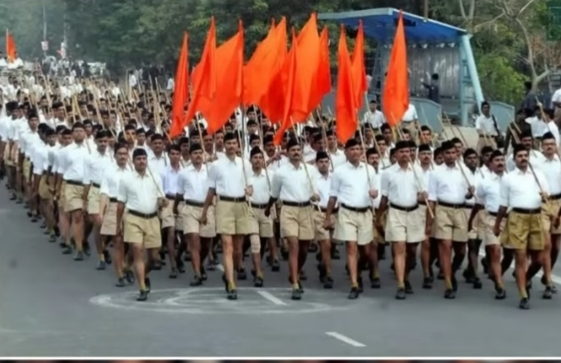NEW DELHI: Rastriya Swayamsevak Sangh (RSS) has historically expressed ideological opposition to certain values like socialism and secularism as framed in the Indian Constitution, especially during and after the Emergency period (1975–77) when these terms were explicitly added to the Preamble.
The words “socialist” and “secular” as also “integrity” were added to the Preamble of the Indian Constitution by the 42nd Amendment Act in 1976, during Indira Gandhi’s Emergency.
Amended Preamble (1976):
“We, the people of India, having solemnly resolved to constitute India into a Sovereign Socialist Secular Democratic Republic…”
The government brought into focus the issue last week by observing 50 years of Emergency to let the RSS raise the issue and question socialism and secularism incorporated by the Indira Gandhi regime in the Constitution’s preamble.
This gave an opportunity to RSS general secretary Dattatreya Hosabole to call for removing Socialism and secularism from the preamble of the Constitution that triggered support by many BJP leaders led by Union Agriculture Minister Shivraj Singh Chouhan. The Congress suspects the government is planning to amend the preamble though difficult as it requires two-third majority in both the Houses of Parliament.
The RSS and affiliated organizations (including the BJP’s ideological lineage) have opposed socialism as state-imposed economic control, arguing that:
It undermines individual enterprise and private property.
It centralizes power and can become authoritarian.
RSS has traditionally supported a cultural-nationalist, self-reliant, market-friendly economy, rooted in “Swadeshi” (indigenous production) rather than Marxist-style socialism.
The RSS has also opposed the Nehruvian and Congress-era interpretation of secularism, which emphasized strict separation of religion and state and equal treatment of all religions.
It accuses Indian secularism of being “pseudo-secularism”, claiming that it has led to minority appeasement (especially of Muslims and Christians).
Hindus are unfairly targeted or side lined in the name of secularism.
The RSS argues for “positive secularism”, where the state respects all religions but acknowledges India’s civilizational identity as primarily Hindu.
Key RSS Statements and Views :
M. S. Golwalkar (second RSS chief) criticized Western secularism and socialism, calling them alien ideologies unsuitable for India.
The RSS views the Constitution as needing reform to reflect Bhartiya (Indian) cultural values, sometimes hinting at a more dharma-based framework.
BJP-RSS Political Reflection :
While the BJP (political arm ideologically aligned with RSS) accepts the Constitution, it has historically demanded removal of “socialist” and “secular” from the Preamble.
Some BJP leaders have suggested a debate on whether these words should stay.
Claimed these values were undemocratically inserted during the Emergency.
RSS’s Alternative Vision :
RSS advocates cultural nationalism centred around Hindu civilizational ethos (Hindutva).
A decentralized, self-reliant economy (not state-run socialism).
A form of secularism that doesn’t suppress Hindu identity but claims fairness to all religions.
The BJP is ideologically aligned with the RSS and it has historically supported its position regarding the preamble, particularly on the words socialist and secular.
The RSS is the ideological parent of the BJP.
Many top BJP leaders, including Narendra Modi, Amit Shah, and others, were RSS members or trained cadres. Therefore, the BJP often reflects RSS thinking in policy and rhetoric, especially on cultural and constitutional matters.
In 2015, some BJP leaders (like then Minister Ravi Shankar Prasad) supported calls to restore the original Preamble (without the 1976 additions).
BJP leader Subramanian Swamy has repeatedly demanded the removal of these two words.
The BJP’s 2014 and 2019 manifestos emphasized “cultural nationalism” and “integral humanism”, not socialism or secularism as defined by Nehruvian frameworks.
Despite its ideological opposition, the BJP has not taken legislative action to remove “socialist” and “secular” from the Preamble.
This may be due to:
Political strategy—avoiding direct confrontation over a sensitive constitutional issue.
Lack of two-thirds majority in both Houses of Parliament, required for a constitutional amendment.
The BJP supports the RSS’s view that the words “socialist” and “secular” were inappropriately added to the Constitution’s Preamble during the Emergency. While the BJP hasn’t yet moved to formally amend the Preamble, it has repeatedly signalled its disapproval of these additions and continues to promote an alternative ideological vision grounded in Hindutva, cultural nationalism, and economic self-reliance.






